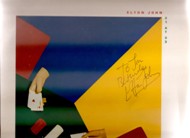Elton, after years as a jobbing musician, finally made his name on the UK music scene in 1971 with his hit Your Song. Many musicians will wonder how long their career would last and no doubt Elton did the same, but 41 years on, he is still doing it with immense success.
Throughout the 1970s he racked up 25 hit singles including; Rocket Man, Crocodile Rock, Goodbye Yellow Brick Road, his first number one Don’t Go Breaking My Heart with Kiki Dee on board and Part Time Love. His albums included Tumbleweed Connection, Honky Chateau, Don’t Shoot Me I’m Only the Piano Player and Blue Moves. As the 1980s arrived, Elton was keen to let everyone know how successful he’d been by the title of his next album, 21 At 33 – his 21st album at the tender age of 33!
Although his albums were regularly making high chart positions, his singles were in a lull. Was there a reason for this? not really is probably the answer, the music scene was changing a little, disco was in full force, new wave was new on the scene and new romantic was on its way. Things were also turning a little electric and Elton had changed producers from Gus Dudgeon to Clive Franks. He and his long time lyricist Bernie Taupin were on a ‘break’ after Elton declined to use any of Bernie’s lyrics on the 1978 album A Single Man. The 1979 album Victim of Love was a disaster with most songs co-written by former Chicory Tip and Donna Summer collaborator Pete Bellotte. The only track not written by him was a bland cover of Chuck Berry’s Johnny B. Goode which failed when released as a single. Although 21 At 33 saw Elton and Bernie reunited, it was only on three of the nine tracks, Chasing The Crown, Two Rooms At The End Of The World and White Lady White powder. Elton began working with song writer Gary Osborne who had written Take Me Back, Dear God and the first single released Little Jeannie (misspelt on the label as Little Jeanie). Give Me The Love was co-written by recent hit maker Judie Tzuke and the other two tracks, Never Gonna Fall In Love Again and Sartorial Eloquence were written by Tom Robinson.
Two Rooms At The End Of The World was about how Elton and Bernie got together, then parted and reunited again. Chasing The Crown lyrically resembled The Stones’ Sympathy For The Devil in as much as they are both puzzles where the listener has to identify the culprit who causes misery and conflict. White Lady White Powder features three members of the Eagles, Don Henley, Glenn Frey and Timothy B. Schmit on backing vocals.
Sartorial Eloquence opens with Elton at the piano sounding despondent. The song expresses a homosexual longing, the object of affection for a stylishly dressed, emotionally unrevealing man, who prefers to leave an intense affair for other pleasures down the road. Could this be because of the sexuality of both its writers? According to the book, His Song, by Elizabeth J. Rosenthal, the music evokes the disappointment of a man left behind which grows in volume and despondency with the introduction of supporting musicians an backing singers finally reaching the chorus ‘Don’t wanna play this game no more’, which, interestingly became the main title of the song in the USA and Sartorial Eloquence only preceding the title in parenthesis, probably catering for the less liberated minds of the American record-buying public. Around the same time Robinson wrote a song about a boy in boarding school who had a crush on another pupil which he called Elton’s Song but it was held back and released the following year on the album The Fox.
When the single was released, it was Elton’s third (after Rocket Man and Saturday night’s Alright for Fighting) to contain two tracks on the B side. Cartier was a 53-second track about Elton’s favourite jewellery. He once explained on an American TV interview, “I feel that in these depressing times, I would write something to cheer myself up.” The other tracks was White Man Danger which hasn’t yet appeared on any album nor issued on CD.
During the 1985 World snooker championship (the one with Dennis Taylor beating Steve Davis in the final), the song was used to great effect as the backing to a montage of impeccably dressed snooker player being knocked out in the earlier rounds.
The image attached is my personally signed copy of the 21 At 33 album when I met Elton in 1980.
